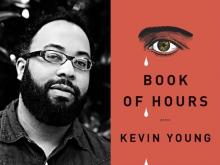Grant Spotlight: Torch Literary Arts
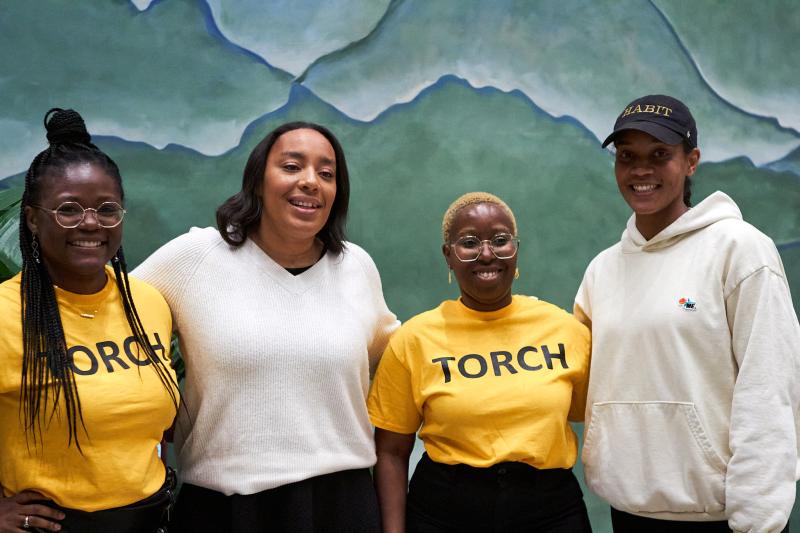
2023 Torch Administrative Fellows, Faith Miller and Karl-Mary Akre (wearing TORCH t-shirts), stand with Vannessa Jackson and Chinaka Hodge at The Turn Up Black Women in the Writers’ Room. Photo by Larry Choyce
In 2006, Amanda Johnston founded Torch Literary Arts, based in Austin, Texas, with the aim of forming a creative space where Black women writers could showcase their work and foster a supportive community. Initially, the organization operated as a dedicated team of volunteers curating an online magazine. Over the past few years, Torch Literary Arts has flourished and evolved, featuring over 200 writers, including renowned authors such as Toi Derricotte, Tayari Jones, Sharon Bridgforth, and Patricia Smith. The organization’s reach has expanded to include programs like the Torch Wildfire Reading Series, workshops, retreats, and special events designed to uplift both emerging and established writers at every stage of their literary journeys.
In May 2023, Torch Literary Arts received an Arts Endowment grant to support a wide range of professional development opportunities for Black women writers, including the 2023 retreat, an opportunity for writers to collaborate, recharge, and receive valuable guidance while dedicating focused time to work on their manuscripts in progress.
We spoke with Johnston about the mission of Torch Literary Arts and the vital role the organization plays in the community, the professional development opportunities for aspiring and published Black women writers, and the importance of carrying the torch and illuminating the path for Black women writers to thrive in the writing field.
NEA: Why do you think creative writing is a critical key for promoting Black women’s voices and stories?
AMANDA JOHNSTON: Our imaginations and creative storytelling are vital to shaping the world we live in and the worlds we dream of. The art we create on the page becomes part of the historical record of the times we live in.
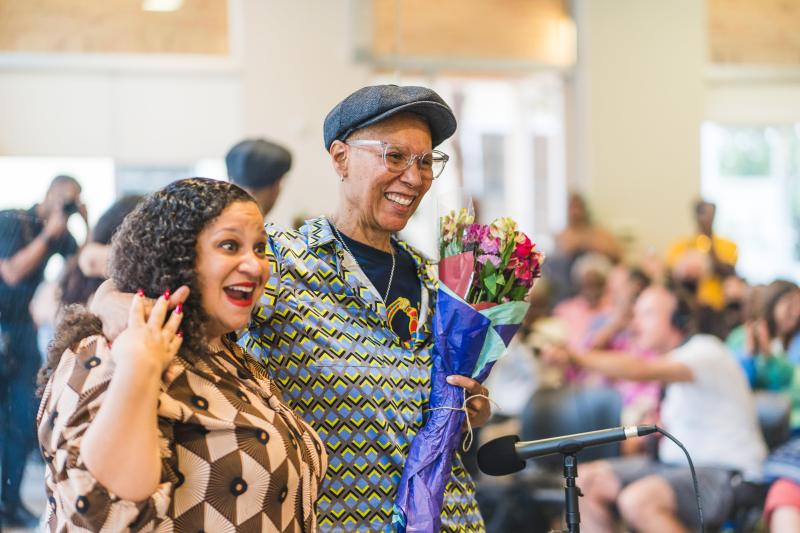
Torch Literary Arts founder Amanda Johnston (left) and author Sharon Bridgforth (right) in front of an audience at the 2023 Austin book launch for bull-jean & demdey back. Photo by Jerrell Trulove
NEA: What are some of challenges that Black women writers face, and how does Torch Literary Arts help combat them?
JOHNSTON: Historically, Black feminist movements receive less than one percent of funding globally. Representation of Black women in publishing and media is also low at less than five percent. Discriminatory systems continue to exclude and silence Black women who dare to share their stories and discourage many from even attempting to do so. However, a Pew Report showed that the number one person most likely to read a book is a Black woman. Torch creates a space to ensure Black women’s voices are part of the literary narrative for readers to enjoy today and future generations to discover tomorrow. Torch was created for us by us and directly responds to the threat of erasure by providing advancement opportunities for Black women writers who want to pursue literary careers and all readers who want inclusive representation in publishing.
NEA: How has funding from the NEA helped support the work of your organization?
JOHNSTON: Funding from the NEA helps Torch support Black women writers with paid opportunities to share their talents through Torch programs. NEA funding directly impacts Torch’s ability to pay artist fees which in turn helps writers develop professional literary careers. In one year, NEA funding will support over 20 Black women writers with professional honorariums to present at Torch events, including the Torch Wildfire Reading Series, creative writing and professional development workshops, during the Torch Retreat, and at special events with the Texas Book Festival and during the South by Southwest Conference in Austin, Texas.
NEA: Can you give us a snapshot of what the Torch Retreat entails? What are the goals for the participants?
JOHNSTON: The Torch Retreat is a space for Black women writers to rest, rejuvenate, and work on their works in progress. Fellows will receive comfortable accommodations and a nurturing environment that values self-care and the fellows’ needs first. Fellows writing across poetry, fiction, and script (plays and screenplays) will have dedicated writing time each morning and plenty of time to be still, read, and dream in the evenings. The goal is to offer Black women writers a space we rarely receive—a space where we are free to create without distractions or interruptions in community with other Black women. For the 2023 retreat, fellows will share their work on July 27, at a public reading in Austin, Texas, and all are welcome to attend.
NEA: Increasing the visibility of Black women writers, the Wildfire Reading Series features local and notable authors throughout the year. What do you hope audience members walk away with after attending the reading series?
JOHNSTON: The Wildfire Reading Series features Black women writers who had books published in the last two years or who have been previous online Torch Features. The goal is to amplify Black women writers and their work for readers to discover. Visibility is important for audience members to see diverse representation across literature and to make real-time connections with authors, new work, and the community.
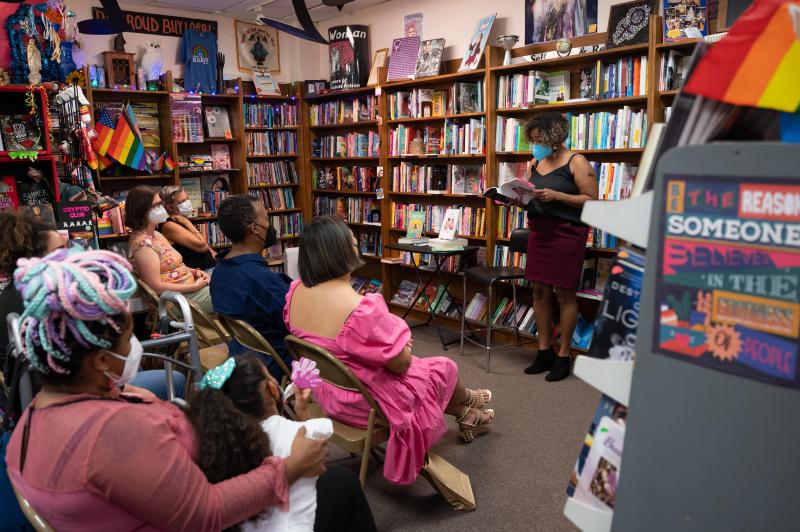
Author Jasminne Mendez reads in front of an audience at BookWoman Bookstore in 2022. Photo by Cindy Elizabeth
NEA: What are some of the other ways in which Torch Literary Arts engages with the community?
JOHNSTON: Torch is committed to adding to the vibrant literary community locally, nationally, and internationally. We partner with organizations with similar values to reach a wider audience such as being a community partner with the Texas Book Festival and curating special programs with the Blanton Museum of Art, the Contemporary Austin, and Black Mamas ATX—a nonprofit dedicated to ending the Black maternal health crisis. To continue to grow a diverse community of writers, Torch invites BIPOC women writers to attend our workshops and join our bi-monthly writing circle that meets both in-person and virtually for writers of all experience levels. Our programs are provided at no cost to remove financial barriers and increase access for those who may otherwise not be able to attend.
On June 20th, 2023, Torch presents Carrying the Torch: A Juneteenth Remembrance and Reading for the Future to mark the federal holiday at the Texas State Capitol in Austin, Texas. The event is open to the community and will feature guest speakers and poets at the Texas African American History Memorial and conclude with food and music at the City of Austin African American Cultural and Heritage Facility. The goal of this event is to reflect on the historical significance of Juneteenth and celebrate the future of African Americans in literature and life.
NEA: What do you wish you could do more of as an organization?
JOHNSTON: Reach more Black women writers who need our support. Submissions for our online publication have increased by 49 percent and we accept about 19 percent for our Friday Features due to budget and capacity limitations. Our workshops are full within a few days of announcing them and consistently have long waitlists. We received 133 applications for our inaugural retreat with only six fellowships available. We know the number of retreat applicants will increase in the coming years. We recently launched a bi-monthly writing circle that meets in-person and virtually to add another opportunity for support and connection for BIPOC [Black, Indigenous, people of color] women writers. Virtual participants join the circle over Zoom from across the country and internationally. Some have joined from as far away as South Africa, Haiti, and France. With additional support, Torch would be able to increase the number of writers we support and build a global network of storytellers to inspire generations of writers and readers for years to come.
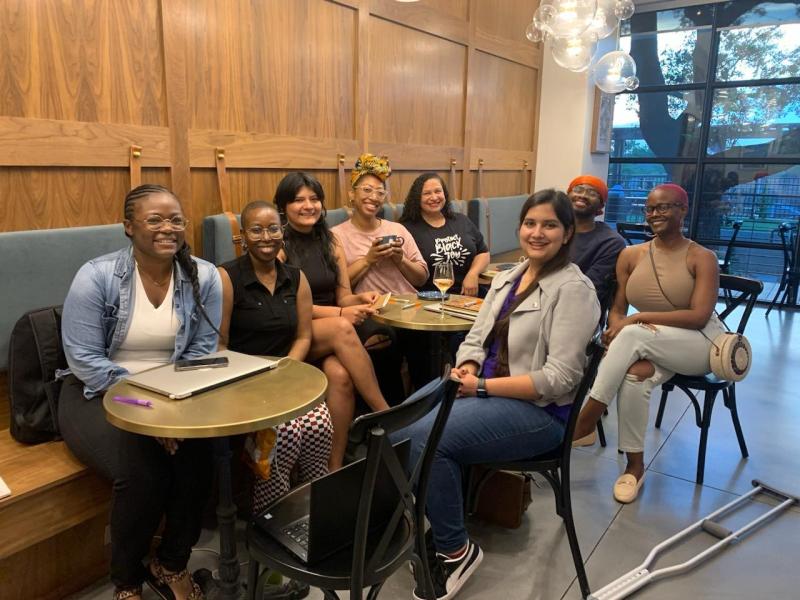
Participants collaborating at the 2023 Torch Writing Circle. Photo courtesy of Torch Literary Arts
NEA: Which books from Torch Features do you recommend for us to add to our Must-Read List this summer?
JOHNSTON: There are so many great books by Torch Features to choose from! Fiction—Nobody’s Magic by Destiny O. Birdsong and The Birds of Opulence by Crystal Wilkinson and Holler, Child: Stories by LaToya Watkins. Poetry—Golden Ax by Rio Cortez, BloodFresh by Ebony Stewart, and Muse Found in a Colonized Body by Yesenia Montilla. Drama—Underground, Monroe, and the Mamalogues: Three Plays by Lisa B. Thompson and bull-jean & dem/dey back by Sharon Bridgforth. Children’s books—Mama’s Home by Shay Youngblood, The ABCs of Black History by Rio Cortez, and Juneteenth: Our Day of Freedom by Sharon Dennis Wyeth.
NEA: What advice would you give to a young writer trying to publish their first book, play, short story, or poem?
JOHNSTON: Read and write, and read and write some more! A writer discovers their voice through reading and revision. Read the books and publications of writers you admire. Only submit your work to places where you really want your work to be published. Share your writing when it is ready. Take your time. Do your work. Fall in love with the discovery of the work and tend to your craft. Take good care of it. Take better care of yourself.
NEA: Finish this sentence. Black women’s voices in literature matter because…
JOHNSTON: It is impossible to have the full story of humanity without us.


